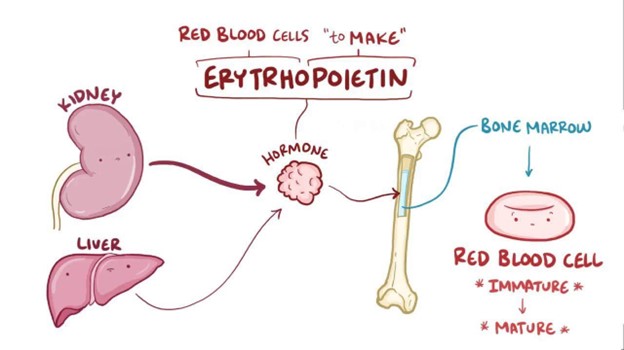A client with chronic renal failure asks the nurse the effects of losing erythropoietin. Which of the following statements best explains the loss of this hormone?
Loss of erythropoietin will result in diminished immunologic function.
Loss of erythropoietin will result in hypertension.
Loss of erythropoietin will result in elevated lipid levels in the bloodstream.
Loss of erythropoietin will result in anemia.
The Correct Answer is D
Choice A Reason: Loss of erythropoietin will not result in diminished immunologic function, but it may affect the production of some white blood cells and antibodies.
Choice B Reason: Loss of erythropoietin will not result in hypertension, but it may cause hypotension due to reduced blood volume and viscosity.
Choice C Reason: Loss of erythropoietin will not result in elevated lipid levels in the bloodstream, but it may be associated with dyslipidemia due to other factors such as malnutrition, inflammation, or medication use.
Choice D Reason: Loss of erythropoietin will result in anemia, as erythropoietin is a hormone that stimulates the bone marrow to produce red blood cells.

Nursing Test Bank
Naxlex Comprehensive Predictor Exams
Related Questions
Correct Answer is B
Explanation
Choice A Reason: Instructing the client to increase fluid intake is not the most appropriate nursing action, as it does not address the cause or severity of the bleeding.
Choice B Reason: Notifying the health care provider is the most appropriate nursing action, as it indicates that the client may have a bleeding ulcer that requires immediate evaluation and treatment.
Choice C Reason: Advising the client to take iron rich foods is not the most appropriate nursing action, as it does not prevent or correct anemia or bleeding.
Choice D Reason: Documenting the findings is not the most appropriate nursing action, as it does not initiate any intervention or outcome.

Correct Answer is D
Explanation
Choice A Reason: Compressing the nares is not the first action that the nurse should take, as it may increase intracranial pressure and worsen the head injury.
Choice B Reason: Administering decongestant for postnasal drip is not the first action that the nurse should take, as it may mask the signs of cerebrospinal fluid (CSF) leakage and delay diagnosis and treatment.
Choice C Reason: Tilting the head back is not the first action that the nurse should take, as it may cause aspiration of CSF or blood and increase the risk of infection.
Choice D Reason: Collecting the drainage is the first action that the nurse should take, as it helps to identify if the drainage is CSF or nasal secretions, and to monitor the amount and characteristics of the drainage.
Whether you are a student looking to ace your exams or a practicing nurse seeking to enhance your expertise , our nursing education contents will empower you with the confidence and competence to make a difference in the lives of patients and become a respected leader in the healthcare field.
Visit Naxlex, invest in your future and unlock endless possibilities with our unparalleled nursing education contents today
Report Wrong Answer on the Current Question
Do you disagree with the answer? If yes, what is your expected answer? Explain.
Kindly be descriptive with the issue you are facing.
